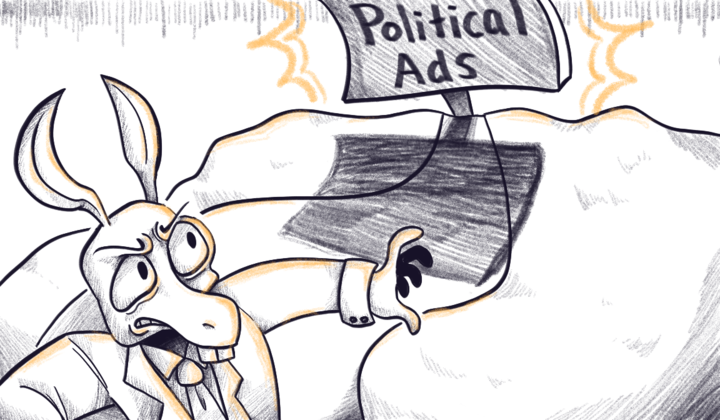The nine-year-long struggle against former president Donald Trump for the Oval Office has forced the Democratic Party to deploy every gadget on their belt, and with good reason. Trump has no shame disdaining and disregarding American democracy. He has openly made remarks about terminating parts of the constitution. On Jan. 6, he assembled and whipped up an angry mob of his supporters, encouraging them to “fight like hell,” and that mob then invaded the Capitol. And four years later, he has still not admitted to losing the 2020 election. Faced with these realities, the Democratic Party has had to reconfigure its approach to political discourse. And recently they made a massive sacrifice: decorum.
A scrambling Democratic Party might evoke an image of President Joe Biden’s dramatic dropout earlier in the election. It was one of the on-the-fly changes the Democrats had to make to strengthen their fight against Trump. After Biden’s disastrous debate performance in June and eventual dropout from the race, they raced to build a new campaign around Vice President Kamala Harris — one that ran on hope, images of the future, and laughter. But this wasn’t doing enough, and the polls were still neck and neck. The Democrats had to deploy their wild card: returning insults with, well, more insults. This change in strategy was somewhat overshadowed by political drama as the actual face of the Democratic Party switched from Biden to Harris, but it would become very noticeable in the following weeks.
Before Harris, the Democratic Party had been run on the philosophy of “going high,” as former First Lady Michelle Obama famously put it. She urged her party to respond to hate with dignity and to never stoop down to the level of the insults they encounter. This idea formed the foundation of much of Biden’s campaign. Biden sought to portray himself as a rational alternative to Trump, leading by example. He tried — and occasionally succeeded — in saying the right things. He comported himself as a politician should, albeit an aging and increasingly incomprehensible one. But Biden’s presence on TV was too thin. Taking the high road doesn’t impress an electorate if one can barely walk down it. He looked physically lost on stage. The polls tilted increasingly in Trump’s favor, and much to the terror of his party, Biden, the candidate who emphasized his own honesty as a keystone of his campaign, denied their veracity. “Going high” was not working.
When Harris took the reins, her campaign had to figure out how they were going to speak about Trump. Biden had struggled to come across as tough, and Harris hoped to fill in where he had failed. As her campaign progressed, Tim Walz, her vice-presidential pick, began experimenting with the term “weird” to describe Trump and his vice-presidential pick J.D. Vance. It gained wide popularity. In a podcast for The Atlantic titled “Laughing at Trump,” Hanna Rosin aptly commented, “It’s like ever since Democratic vice-presidential candidate Tim Walz said the word weird — Trump is weird, J. D. Vance is weird, their policies are weird — a door opened up, and Democrats rushed right through it.”
With the Democratic National Convention, Harris faced the opportunity to firmly establish the direction of her campaign. And, as if in a coordinated shift, wave after wave of speakers came on and delivered on the new strategy, critical as ever of Trump, but now unafraid to openly mock him. Perhaps most notably, during former president Barack Obama’s speech, who mentioned Trump’s “weird obsession with crowd sizes” while looking down at his hands to gesture size, a clearly phallic reference.
On Sept. 10, at a presidential debate hosted by ABC News, Harris once again chose the low road, deftly goading Trump into a pathetic, self-aggrandizing rant with a telegraphed jab about the crowd sizes at his rallies.
It’s clear at this point that the Democratic Party is firing on all cylinders, trying to do everything they can to win over the votes they need for this election. Every move they make has been strategically planned to sway the American public in their favor as much as possible. They are desperate and are doing whatever they think will work. It is sad that they have resorted to the same petty insults they have held out against for years.
Democrats may have been frustrated by the failures of taking the high road in the past, but at least they once believed that ultimately, propriety would appeal to voters. The Harris campaign’s departure from this demonstrates that even politicians on the left who outwardly praise civility, respect, and normalcy have realized what Trump realized long ago: the entertainment factor can be more important to a campaign’s success than actual policies.
The high road might not be an election winner, and Harris may have had no choice but to abandon it for more entertaining rhetoric in a critical election that seems to be going less and less in her favor. But politics is not supposed to be like this, and, for the health of America, it cannot stay this way. If the low road works for the Democrats, and they manage to beat Trump with his own rhetoric, then they must be able to turn it off after this election cycle and revive policy-based political discourse. Kamala Harris wants to beat Donald Trump to protect democracy. She should make sure her rhetoric is contributing to a healthy one.











